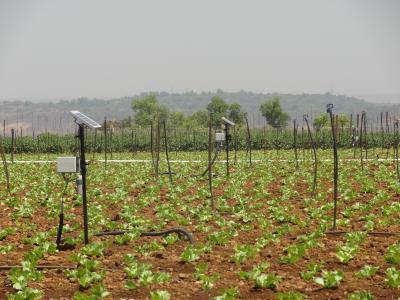
It is increasingly becoming apparent that technology can enhance the productivity of resource-challenged agricultural practices in developing countries. In India, the agriculture uses 80% of available water and out of which 40% water is wasted. Over irrigation causes the leaching of micro and macro nutrients from the soil contaminating the ground water and reduced crop yield. The efficiency of water usage in the agricultural fields needs to be improved. With this motivation, we have developed a low cost soil monitoring system.
The system is equipped with soil moisture sensor, soil temperature sensor, ambient humidity sensor and ambient temperature sensor. Based on these parameters, farmers are advised for irrigation control. The developed system finds application in open farm, green houses gardening and research or agricultural labs Fig.1 lists the key features of the entire system developed by us the system is powered by solar panel and it is capable of working for 3-4 days without solar energy. Entire system is made modular, where each components of the system like solar panel,signal processing unit and sensors can be replaced individually. The system is designed according to the Indian farmer’s condition. The height of the system is adjustable and it can be varied from 1-3 m based on the crop types.Data from all the sensors are logged into a mobile phone using GSM and on cloud using IoT. Data from the cloud can be accessed from anywhere in the world.
Technical specifications of sensors
Sensors
Measurement range
Accuracy
Response time
Soil moisture
0 – 100%
±3%
10 seconds
Soil temperature
5 – 80 C
±1%
5 seconds
Ambient humidity
0 – 100% RH
±1%
5 seconds
Ambient temperature
5 – 80 C
±1%
5 seconds
Field deployments
The prototypes of the soil monitoring system are developed and tested successfully in our laboratory environment. The developed system can measure soil moisture content, soil temperature, relative humidity, and ambient temperature. Fig. 2 shows the pilot studies across various regions in India and dashboard for data analysis. We had tested the prototype in Lonavala (lettuce farm) for one crop cycle. The prototypes were also tested at agricultural universities in IARI, Delhi and PJTSAU, Hyderabad with the help
of farmers. The developed system is being improvised based on the feedback from the agricultural labs and farmers. Currently our systems are being piloted at different states in the country.
Prof. Maryam S. Baghini
